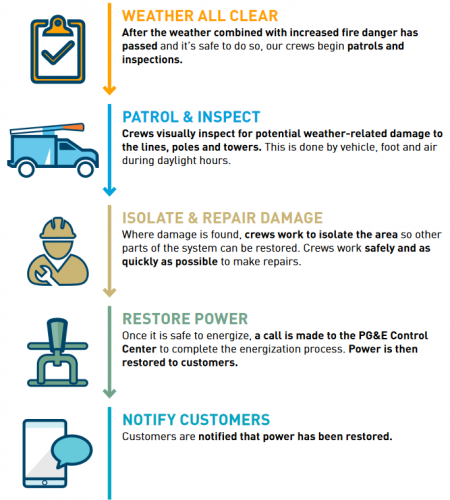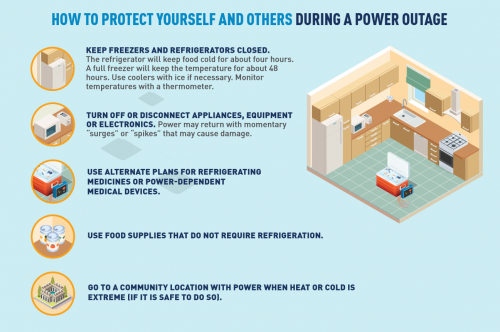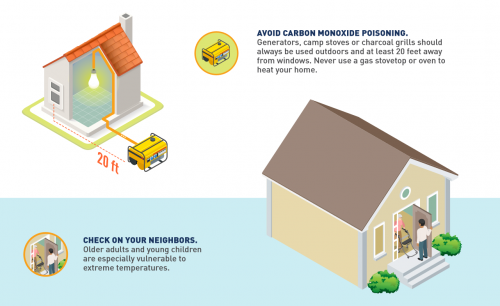Power Outages
Public Safety Power Shutoff (PSPS) in the Mother Lode
Up to Date Information: For breaking news, listen to KVML (1450AM and FM102.7), KZSQ (Star 92.7FM) or KKBN (93.5FM) for power outage information. Clarke Broadcasting, including MyMotherLode.com has back-up generators and will deliver regular and breaking news updates.
No single factor drives when PG&E may choose to de-energize powerlines. Known as a Public Safety Power Shutoff (PSPS) PG&E will use a three level system to note the likelihood that power will be turned off from “Elevated” to “PSPS Watch” to “PSPS Warning.” PG&E’s goal is to send customer alerts 24-48 hours prior to shutting off power but the public may not be notified until the day of the threatening weather and the power may be out for several days. Factors include a “Red Flag” fire warning from the National Weather Service, low humidity levels, forecasted sustained winds above 25 mph (or excessive winds over 45pm) and extreme fuel conditions.
“Resiliency Centers” may be set up to give citizens a place to go to get water and electricity or just cool off. The designated locations will be announced when they are opened during a PSPS.
The decision to turn off the power and the speed at which it is restored is planned and managed solely by PG&E. Citizens are strongly urged to prepare for being without power for possibly 5 days or more.
Water and sewer treatment plants along with the water distribution and sewer collection system manage multiple back-up generators at critical sites but interruptions may still occur and residents will be asked to conserve water.
Schools may close. School officials will decide when it is necessary, then parents and the public will be notified similar to a snow closure or delay.
Food Safety Tips During Power Outages from the FDA is hereand FEMA’s guidelines are below.
Turn off appliances: If you experience an outage, unplug or turn off all electrical appliances to avoid overloading circuits and to prevent fire hazards when power is restored. Simply leave a single lamp on to alert you when power returns. Turn your appliances back on one at a time when conditions return to normal.
Traffic Signals: Treat all dark or flashing stoplights as a four-way stop. At a four-way stop if two vehicles reach the intersection simultaneously, the vehicle on the left must yield the right-of-way to the vehicle on the right.
Power Outage Check List
Prepare Now
- Take an inventory now of the items you need that rely on electricity.
- Talk to your medical provider about a power outage plan for medical devices powered by electricity and
refrigerated medicines. Find out how long medication can be stored at higher temperatures and get specific
guidance for any medications that are critical for life. - Plan for batteries and other alternatives to meet your needs when the power goes out.
- Sign up for local alerts and warning systems. Monitor weather reports.
- Install carbon monoxide detectors with battery backup in central locations on every level of your home.
- Determine whether your home phone will work in a power outage and how long battery backup will last.
- Review the supplies that are available in case of no power. Have flashlights with extra batteries for every household member. Have enough nonperishable food. Store at least one gallon of water per person per day, for drinking and sanitation.
- Use a thermometer in the refrigerator and freezer so that you can know the temperature when the power is restored.
- Keep mobile phones and other electric equipment charged and gas tanks full.
- Know how to manually open your garage door. (view this video) As detailed here backup batteries are required for new garage door openers.
Protect Yourself During A Power Outage
- Keep freezers and refrigerators closed.
- Only use generators outdoors and away from windows.
- Do not use a gas stove to heat your home.
- Disconnect appliances and electronics to avoid damage from electrical surges.
- Have alternate plans for refrigerating medicines or using power-dependent medical devices.
- Go to an alternate location for heat or cooling.
- Check on neighbors. Older adults and young children are especially vulnerable to extreme temperatures. Go to a community location with power if heat or cold is extreme.
- Businesses will only be able to accept cash during a power outage, banks will close. ATM’s will not work.
- Keep a full tank of gas in vehicle, reduce or eliminate unnecessary travel to conserve gas.
Food: According to the American Red Cross, an unopened refrigerator will keep food cold for four hours. After this, temperatures will begin to rise to unsafe levels. A full, unopened freezer will keep food frozen for 48 hours; a half-full freezer will stay frozen for 24 hours. During an outage, it’s helpful to have a food thermometer on hand. You can use it to see which foods are safe to eat by checking the temperature of the refrigerator. Throw out any food that has been exposed to 40-degree temperatures for two hours or more.
Please use 911 for emergencies only, view the FCC’s emergency tips here.
Septic Systems: Minimize water use in sinks, toilets, showers, and washers. Small electric septic tank pumps will not function during power outages unless a home backup generator is hooked up and could overflow. Homes that are connected to a sewer collection system use septic tank pump systems or grinder pump systems, which require power to function. Those with sewage grinder pump tanks should keep in mind that these kinds of tanks have essentially no storage at all and could overflow even with very little water usage and must have their water flow stopped immediately.
District/Utility Sewer System: If you pay for sewer from a utility district, if the main sewer is out of power and back-up generators are insufficent toilets and drains will not work. Utility districts will notify customers through public information systems like the radio if a sewer system is experiencing problems. In general utilities urge customers to avoid unnecessary uses of water: watering lawns and outdoor landscaping, washing vehicles, filling swimming pools, washing off hardscapes, flushing toilets after every use, washing clothes, running the dishwasher and taking baths or long showers.
Use flashlights, not candles: During a power outage, use battery-operated flashlights, and not candles, due to the risk of fire. If you must use candles, please keep them away from drapes, lampshades, small children and pets. Do not leave candles unattended.
Have a backup phone: If you have a telephone system that requires electricity to work, such as a cordless phone or answering machine, plan to have a standard telephone or cellular phone ready as a backup.
Have fresh drinking water, ice: Freeze plastic containers filled with water to make blocks of ice that can be placed in your refrigerator/freezer during an outage to prevent foods from spoiling. Blue Ice from your picnic cooler also works well in the freezer.
Use generators safely: Customers with standby electric generators should make sure they are properly installed by a licensed electrician in a well-ventilated area. Improperly installed generators pose a significant danger to crews working on power lines. If using portable generators, be sure they are in a well-ventilated area.
Turn off appliances: If you experience an outage, unplug or turn off all electrical appliances to avoid overloading circuits and to prevent fire hazards when power is restored. Simply leave a single lamp on to alert you when power returns. Turn your appliances back on one at a time when conditions return to normal.
Make sure to have enough medications on hand (contact your pharmacist or doctor about temperature concerns if medication needs to be kept cold) Have medication for you and your pets as well as spare food and water. Avoid all outdoor burning and other activities that could pose a fire danger. Ensure generators are installed and being used properly. Check on your neighbors, especially the elderly, frail, or those with access and functional needs.
A power outage checklist from the Red Cross is here.
What to do after the power goes off
- Unplug or turn off appliances, equipment and electronics to avoid damage caused by surges when the power is restored.
- Stoplights have battery back-up power and will go to a flashing red light which should be treated as a four-way stop.
- Leave a single lamp on to alert you when the power returns. Then, turn your appliances on, one at a time.
- Be sure to use generators, camp stoves or charcoal grills outdoors only. Do not use a gas stove for heat.
What to do when the power returns
- When in doubt, throw it out! Throw away any food that has been exposed to temperatures 40 degrees or higher for two hours or more, or that has an unusual odor, color, or texture.
- If the power is out for more than a day, discard any medication that should be refrigerated, unless the drug’s label says otherwise. If a life depends on the refrigerated drugs, consult a doctor or pharmacist and use medicine only until a new supply is available.
myMotherLode Fire Directory
Communities in the Mother Lode are especially vulnerable to wildfire, it’s important to be prepared. MyMotherLode.com was the source for local information during the 2013 Rim Fire and the 2015 Butte Fire, also in Mariposa the 2017 Detwiler Fire and one year later the Ferguson Fire, Donnell Fire, and Boot Fire.
The links above will give you some tools and practical information about reducing the risk of wildfire for your home and family. By respecting the defensible space rules, planning evacuation routines in advance and you can do a lot to protect your property and loved ones from wildfire.
Events
Calaveras Master Gardeners Demonstration Garden | 11:00 am - 4:00 pm
Off Highway Vehicle (OHV) Open House
Stanislaus National Forest Headquarters | 5:00 pm - 8:00 pm
Dodge Ridge Mountain Resort | 10:00 am - 3:00 pm
Special Feature 'Return to Palau'
Sonora Seventh Day Adventist Church | 6:30 pm
Calaveras County Animal Services | 10:00 am - 2:00 pm
League of Women Voters of the Mother Lode February meeting
Tuolumne County Library | 10:00 am - 12:00 pm
Open Garden Day - Fruit Tree Pruning
Demonstration Garden | 10:00 am - 1:00 pm





